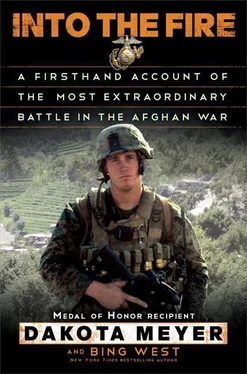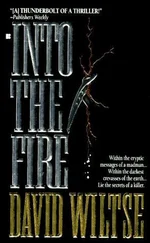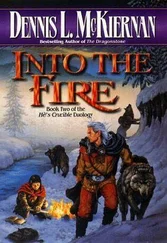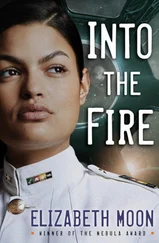“We could get pretty stuck in here!” Rod yelled.
The truck had very little traction and absolutely no cover.
“Then I guess we’ll die with them!” I yelled back.
What else could I say? We weren’t going back.
Rod shifted into low gear and we bounced forward over the bowling ball-sized boulders. Up ahead, I saw a cloud of yellow smoke—then I saw our Command Group stagger out of it. I recognized Maj. Williams and 1st Sgt. Garza stumbling forward. Some others were supporting a wounded Army soldier. I saw Capt. Swenson yelling orders. I couldn’t reach him over the radio, but no words were needed. With a Kiowa overhead, the Command Group was trying to get out of the wash. They included about six Americans and six Afghans—no one from Team Monti. We couldn’t fit them all in the vehicle, so we would just have to give them cover while they moved.
“I don’t want to shoot blind through that smoke!” I yelled. There might be more of our guys coming through it. We did have to give them cover from their rear, somehow.
“I’ll pull around to the other side of the smoke!” Rod yelled back. “Get ready to fire.”
He rocked the truck over the rocks and through the foul-smelling smoke until we bobbled into the open on the far side. The volume of incoming fire didn’t seem that bad: bullets from two PKM machine guns a good way up the valley and AK rounds from the nearby terraces were cracking past us. I returned fire in the several directions to slow down their rates of fire. When I looked behind me, the smoke had cleared, and the Command Group had made it out of the wash and into the trace leading back to the casualty collection point.
“Let’s move up until they see us!” I yelled, meaning my team.
To our right, about four hundred meters away and thirty stories up the slope, was the schoolhouse that was now an enemy machine-gun bunker. Our truck was taking a few whacks from the PKM, but 7.62-millimeter bullets couldn’t punch through our three-inch steel.
My .50-caliber rounds couldn’t break through the concrete schoolhouse, but we were a moving target and they weren’t, and I could suppress their fire whenever I raked their open windows.
From the western edge of North Ganjigal, another PKM was chipping away at us. Its exact location was impossible to spot, because it wasn’t firing any tracers. I could see a crevice the gun might be nested in, so I sprayed in that general direction.
To our right on the ridge above the terraces, a third PKM sometimes shot at us. That gun was also engaging Kaplan at our northern outpost. I just didn’t have time for that one, so I ignored it.
In South Ganjigal, about four hundred meters ahead, a few women and children were running back and forth among the houses. Below the houses, a few guys without weapons stepped out from behind terrace walls, looked at our truck, and ducked out of sight. Maybe they were farmers with rocks in their heads. In other villages, sometimes civilians had stood gawking while I exchanged fire with dushmen. Insanity.
Once I had a rough idea where the fire was coming from, I shifted my gaze to take a general look around. The fields around us were littered with the bodies of Afghan soldiers, some tucked up against the terrace walls and others lying behind little rocks or in shallow depressions. It looked like the set of a Hollywood war movie. When the director yelled Action! , I expected the soldiers to stand up and take their assigned places.
For maybe two or three seconds, I didn’t get it. It was surreal, all those bodies just lying there. I couldn’t be looking at corpses. They couldn’t all be dead. Sure enough, as the truck bounced forward, I’d see an Askar wave his hand slightly or twitch his foot back and forth, signals of life from men too scared to move.
In a firefight, you’re shooting blind most of the time. When you hear the first bullets whiffing past your face or the crump of a mortar shell, your body seeks cover—you don’t consciously think about it. Your instincts know it’s time to be absolutely flat on Mother Earth. You shoot from the prone position. If you’re well trained, you aim at where you think the fire is coming from and squeeze off burst after burst. If you’re ill trained, you shoot wild, holding the rifle above your head. Even when you’re doing it right, you rarely have a man in your sights. You shoot at an area where your enemy is also lying down, trying to stay out of sight. Once you’re flat, your enemy can’t see you—unless, like here, he’s up above you. That’s why you always want the high ground in battle. That’s why Ganjigal was hell.
Rod was swerving the Humvee through the rocks, keeping us moving forward while zigzagging. There was a brush of wind past my cheek—a low hum like a bee, which was a round losing velocity and going subsonic. The air was full of static, like listening to a radio in a thunderstorm. A few bullets clinked off our truck, sounding like gravel thrown up by the wheels. We had driven into the middle of a perfect ambush. The contours of the ridges and terraces reminded me of the Roman Colosseum, with the Taliban spectators armed with AKs and our Hummer the only Christian thing moving on the arena floor.
I looked behind us. The Army Humvee with the TOW missile had closed the gap. Its 240 machine gun could cover our rear. Then, and to my astonishment, the TOW truck stopped and began a laborious but determined U-turn. The track was narrow, with ditches on both sides. It took over a dozen back-and-forths for the truck to turn tail and run.
One of the unit’s heavy trucks had slipped off the trace near the casualty collection point and rolled slowly over, landing back on its wheels. The four soldiers inside were strapped tightly in their seats and suffered only mild bruises. The lieutenant turned around and left to go see about it.
We were alone again and very exposed. Puffs of dirt from bullets pelted the ground like hailstones; the air was full of cracklings and rumblings, as if an invisible thunderstorm were rolling across the sky.
Only Rod’s skill at the wheel was preventing me from being hit again and again. Bullets make different sounds when they pass by you. The cracks of bullets breaking the sound barrier mean they’re high, maybe five or ten feet over your head. The bullets that snap close by your ears are the real killers. A few, losing power and slowing down, made a low buzzing sound.
Strange though it may seem, I wasn’t scared or angry. I was beyond that. I didn’t think I was going to die; I knew I was dead. There wasn’t anything I could do about it. I wasn’t a thinking human being. I had gone somewhere else. I wasn’t firing the machine gun; I was the machine gun . Rod wasn’t driving the truck; Rod was the truck .
I had melded with my weapon. I was no more human than the five-foot machine gun I was embracing. We were locked together, metal and flesh. Without that .50-cal, I would have quivered like the Askars, helpless in the storm. But with that weapon, I felt transported. I had something to do until the blackness came.
A .50-cal holds true out to half a mile. There was no wind and little need to fire high to arc the rounds onto targets. The gun shot rounds as big as cigars, and every fourth one was a glowing red tracer. Firing four- to eight-round bursts, I had walked rounds onto targets dozens of times up at Monti. The hills around Ganjigal were no different. I figured out roughly where a target was and let the .50-cal do the walking.
I wasn’t paying any attention to the Afghan soldiers. Rod and I planned to keep driving east until we were obliterated or we found my team. Suddenly, with no warning, five or six Askars who were lying in a terrace about a hundred meters away leapt up and raced toward our truck. Wham , one was shot in the back and pitched forward. Wham , a second man went down screaming. Wham , a third—then the fourth and the fifth.
Читать дальше












